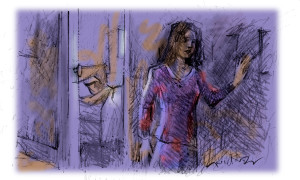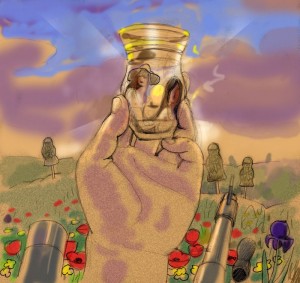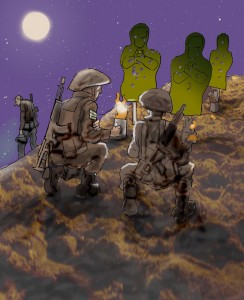Mor felt her way down the hall in the dark. Her hand touched a photograph hanging lower than she remembered and sent it swinging, but she steadied it before it fell. She would make no noise and turn on no lights. If Bar and Ayala woke up she would have no quiet to think in. Halfway down she turned back and peered at Aryeh. He was on his back. Suddenly an arm rose and flopped down where she had formerly lain. A hand searched, fruitlessly. Soon he would snore. He would not stir, though, even if Bar and Ayala began to cry, because, by his account, he had averaged just four hours of sleep for the past week and a half. Now he was home from the army for two nights. She closed the door softly and went back down the night hall.

The armchairs cast shadows. Street light, filtered through translucent blinds, penumbraed the room. She sat in the closer chair, older but more comfortable. Looking down, she touched the sore spot on her left breast. Aryeh had fallen right on it after he came. Why did men do that? Couldn’t he hold himself up? She was not made of foam rubber, she had told him many times. “I can’t help it, it’s like everything inside me has come out,” he said. “Not everything, just some semen,” she’d correct him. Then he’d kiss her and roll off and take her in his arms and drip everything inside him all over her. And the sheets. No wonder she could never fall asleep afterward.
If this night were a story, she reflected, here would be the point where the bombshell would come. “She reached under the sofa cushion and drew out a photograph of Eli.” Or, “It was time for her to leave.” Or “The gun felt cold under her nightgown.” But she did not have another lover, she was too tired to leave, and she was wearing a sweatsuit, not a nightgown. It was December, after all.
He was always so eager when he came back from the army. Affectionate, and intense. If it weren’t for the children he would lead her straight from the kiss at the door to the bedroom. Like he used to do.
reserve duty
Spring — “Necessary Stories” column from The Jerusalem Report
Dani held his coffee glass up to the sky. The residue the Turkish coffee grounds left on the sides filtered the rays of the late March sun like a gossamer veil that brings to light precisely what it hides.
Nuriel, Dani, and I were on our bellies on the top of a desert hill come to life for a brief week or two after a late and south-wandering thundershower. We lay on velvet-red poppies with voluptuous black irises and brassy-yellow mustard flowers watching two formations of our platoon converge from the west and south on the slopes of the next hill over. That hill, guarded by evil-eyed cardboard cutouts of Syrian soldiers, was ours to conquer. Nuriel, Dani, and I were the fire team meant to keep the paper riflemen’s heads down with high-intensity machine gun and mortar fire until the two attack forces were positioned to make their final run toward the defensive positions. Nuriel’s arm, its spare dark down glistening, was draped over his MAG machine gun. Dani’s much thicker elbow rested on a pack full of assorted charges for his 60mm mortar. I was the team leader. The platoon had done a dry run of the maneuver an hour before and now the live fire version was beginning. But the formations were still far off and we awaited our lieutenant’s order to begin the barrage. So we had taken the opportunity to make a round of coffee on Nuriel’s camp stove.

illustration by Avi Katz
Nuriel, a baby-faced kid new to our unit, just six months past his three-years stint in the Givati Brigade, was explaining to us why he had felt compelled to tell Merav, to whom he had just gotten engaged, that he first fell in love with another woman on a flower-strewn hill like this one during his first furlough after basic training.
“My friend Mendy and I were hiking a trail on Mt. Meron in the Galilee,” he told us, “and we saw two spots of white on a boulder. We got closer and saw that it was two girls in linen shirts washing their faces in a spring that spurted out from the side of the mountain into a large pool.
Winter — “Necessary Stories” column from The Jerusalem Report
Haim Watzman
“Can I get some cooperation here?” asks Yoel in the firm but plaintive voice of a reserve platoon commander.
Tourjeman, Brosh, and I are sitting like three monkeys (bald, sandy blond, bearded; wiry, fit, and flabby) on a small mound at the foot of the dusty spur that we’ve been charging up all afternoon. The cardboard targets scattered there, painted in green with the suggestive outline of a helmet-clad infantrymen aiming straight at us, are full of holes already. We have our arms crossed over our chests and our heads are down because we’re trying to stick our noses into the warm place between our arms and our torsos. 
illustration by Avi Katz
An icy wind inflates the backs of our shirts, which are soaked with sweat from our last charge up the hill with full packs. The platoon’s other guys are scattered around near us. Amar and Kochin, short and solid like Middle Earth dwarves laboring at a forge, are desperately trying to light a gas stove to make coffee, even though they know the canister’s empty. Mandelbaum the radioman switches on his flashlight so he can continue to read the book he’s been perusing during breaks in the training. He reads like a goat grazes, whatever’s at hand, halachic responsa, windblown newspapers, the labels on cans in ration boxes. Diki has splayed himself on the hood of the truck that brought us here, trying to absorb some of the heat that the gray metal has stored from the fierce afternoon sun.
Tourjeman, who’s the platoon medic, accuses Yoel. “We’re all going to die of hypothermia. You said we’d be back on base before dark.”
“Only idiots go out to train in the Negev and don’t bring their coats with them,” says Yoel, who did not bring his coat, either.
A Guy at a Bus Stop — New “Necesssary Stories” column in The Jerusalem Report
I spotted Guy at the shabby bus stop on the south-bound side of the Geha Highway, at the foot of the narrow bridge that leads to the Ramat Gan campus of Bar-Ilan University, near the predominantly ultra-Orthodox city of Bnei Brak.
Most highway bus stops in Israel have been cleaned up, but 30 years ago, they all looked like this – pockmarked, cracked, crumbling, covered with graffiti and posters. Trash litters the ground, and behind us, down in a gully, stands a small trailer-cum-snack bar, whose stick-skinny and unshaven proprietor sprawls on one of several plastic chairs scattered around his enterprise, which may or may not be legal, but looks like it isn’t.





